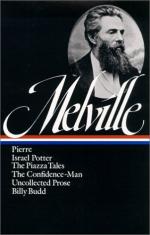After breakfast, next morning, he was proceeding to go with the laborers to their work, when his employer approaching him with a benevolent air, bade him return to his couch, and there remain till he had slept his fill, and was in a better state to resume his labors.
Upon coming forth again a little after noon, he found Sir John walking alone in the grounds. Upon discovering him, Israel would have retreated, fearing that he might intrude; but beckoning him to advance, the knight, as Israel drew nigh, fixed on him such a penetrating glance, that our poor hero quaked to the core. Neither was his dread of detection relieved by the knight’s now calling in a loud voice for one from the house. Israel was just on the point of fleeing, when overhearing the words of the master to the servant who now appeared, all dread departed:
“Bring hither some wine!”
It presently came; by order of the knight the salver was set down on a green bank near by, and the servant retired.
“My poor fellow,” said Sir John, now pouring out a glass of wine, and handing it to Israel, “I perceive that you are an American; and, if I am not mistaken, you are an escaped prisoner of war. But no fear—drink the wine.”
“Mr. Millet,” exclaimed Israel aghast, the untasted wine trembling in his hand, “Mr. Millet, I—”
“Mr. Millet—there it is again. Why don’t you say Sir John like the rest?”
“Why, sir—pardon me—but somehow, I can’t. I’ve tried; but I can’t. You won’t betray me for that?”
“Betray—poor fellow! Hark ye, your history is doubtless a secret which you would not wish to divulge to a stranger; but whatever happens to you, I pledge you my honor I will never betray you.”
“God bless you for that, Mr. Millet.”
“Come, come; call me by my right name. I am not Mr. Millet. You have said Sir to me; and no doubt you have a thousand times said John to other people. Now can’t you couple the two? Try once. Come. Only Sir and then John—Sir John—that’s all.”
“John—I can’t—Sir, sir!—your pardon. I didn’t mean that.”
“My good fellow,” said the knight looking sharply upon Israel, “tell me, are all your countrymen like you? If so, it’s no use fighting them. To that effect, I must write to his Majesty myself. Well, I excuse you from Sir Johnning me. But tell me the truth, are you not a seafaring man, and lately a prisoner of war?”
Israel frankly confessed it, and told his whole story. The knight listened with much interest; and at its conclusion, warned Israel to beware of the soldiers; for owing to the seats of some of the royal family being in the neighborhood, the red-coats abounded hereabout.
“I do not wish unnecessarily to speak against my own countrymen,” he added, “I but plainly speak for your good. The soldiers you meet prowling on the roads, are not fair specimens of the army. They are a set of mean, dastardly banditti, who, to obtain their fee, would betray their best friends. Once more, I warn you against them. But enough; follow me now to the house, and as you tell me you have exchanged clothes before now, you can do it again. What say you? I will give you coat and breeches for your rags.”




